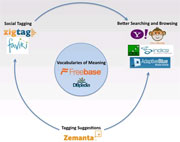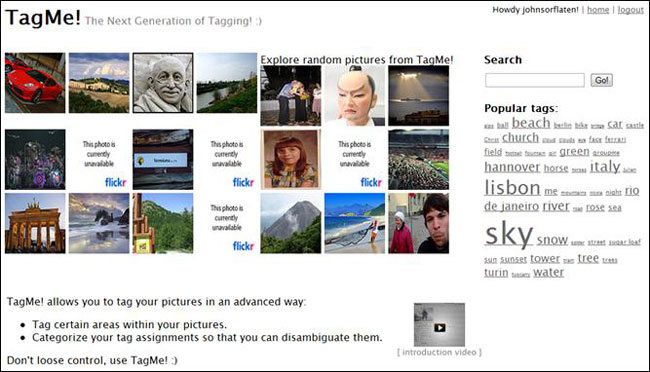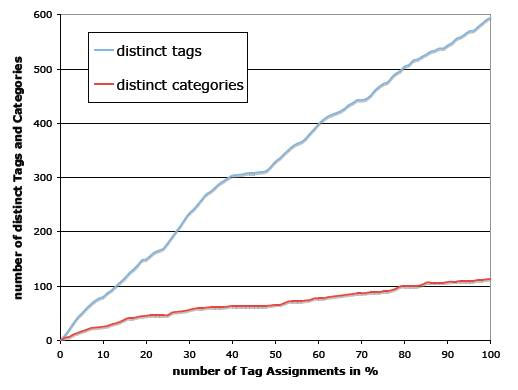- About us
- Contact us: +1.641.472.4480, hfi@humanfactors.com
Cool stuff and UX resources
Introduction
Let's explore a recent job requirement for usability folks that may affect you.
From Flickr.com (seeking Sr. Product Manager):
Build a strategy and product requirements for Flickr features focused on the core photo sharing experience. Partner with user experience team on projects to improve site-wide usability and discoverability.
The usability job skill ("discoverability") in this job description involved finding stuff ‚Äď pictures. In other venues, stuff could be music, books, restaurants, movies, food, clothing ‚Äď or even a document from your organization's intranet.
So, are you supporting your user's need to find the right stuff when they enter their search criteria? This involves "tagging" ‚Äď our topic for this UI Design Newsletter.
But the other job skill (sharing experience) involves user experience, or, as HFI calls it, PET (Persuasion, Emotion, Trust) approach.
Now, let's examine how you can guide your organization in both of these goals: discoverability of just the right product or service ‚Äď but taking into account the PET motivation derived from the social sharing experience (also known in PET terms as "social proof").
We'll report on a 2010 study from seven European researchers affiliated with the L3S Research Center. They aimed to extract additional benefit from the "tagging" efforts by end-users.
As you know, tagging provides social web benefits through "crowd sourcing" efforts in identifying stuff others may want to know about. Delicious.com and other page tagging sites collect tags from folks ‚Äď the "common person". This means everybody helps create a "catalog" of sites, all indexed by a "taxonomy" of common, descriptive words.
Web savants call the results of such tagging a "folksonomy". The resulting taxonomy from the tagging helps folks find what they want using the language given by the masses.
How can you insure your end-users ("folks") use the best tagging practice for objects, concepts, pictures, or documents? That's what we'll learn, next.

How to get better tags from our end-users with minimal extra work
Our researchers created a special add-on to the photo share site Flickr.com as a test vehicle for their ideas. They called it TagMe! The Next Generation of Tagging!.
Here's their home page. Check out their marketing appeals: "Categorize your assignments so that you can disambiguate them." (The word "disambiguate" clearly labels this site as a research site, not a commercial site!)
This study asked participants to tag photos provided in the web site both in the normal way and in a new, more automated manner. Let's see how that works...
- When looking at the picture you recently took of the Sydney Opera house in Australia, you expect to tag it.
- So you enter your tag in the "tag" field. You might enter "Sydney Opera House"
At this point, let us consider what a tag does for you.
Remember "keywords"? That's how we "search". We enter keywords that BEST describe our topic.
If you ever wanted this picture, what would you type? Of course "Sydney Opera House".
Or you could type "Sydney". Or you could type "Opera" or "House".
You get the point. There is some variability here in typing your search terms.
How can we improve on the odds of finding your picture again? We need a "collection" of good words!
So, that's what a tag does for you. You (and hundreds of other folks) have just entered one or more useful keywords. Tags make "discoverability" of content easier for your community of users.
Let's continue...
Figure 2: What participants saw when entering their tags. The addition of "categories" resulted in additional concepts that provided greater "discoverability" of what the end-user wanted in subsequent searches for photos.
- Now, after entering your tag, our L3S researchers offered a NEW function: the "category". Go ahead, follow the instructions given above. How would you categorize your tag? In this case, you might enter "architecture". This word is an umbrella term of which "Sydney Opera House" is a sub-classification.
- Wait, what have you just done? That instruction felt pretty good: it was reasonable, and not too hard. But unknown to you, you get a good benefit: you have added one more excellent keyword! 
- Furthermore, the authors experimental web site also provided "autocompletion" for both tag and category entries. This important qualification indicates that participants benefited by getting "prompts" to help standardize their new entries and increase tag and category consistency.
- The authors applauded autocompletion options for category tagging: "The vocabulary can be aligned much better if categories, which have been applied by other users, are provided as suggestions as well."
Let's take a look at the research results.
For the 600 unique item tags (blue line) end users entered about 110 unique categories (brown line). Fewer unique categories implies that each category' is more inclusive in the number of photos it describes.
Therefore, the use of categories helps cast a more inclusive net to help find the photos it describes. Then the normal "tag" becomes a sub-classification that narrows the search to a more precise conclusion.
Figure 3: Comparison of tag diversity versus category diversity when invented and entered by end-users. Tags are about 5.4 times more diverse than categories. This means "categories" have less diversity and serve to "expand" the results of using that category name as a search term.
The authors indicate "users seem to use different kinds of concepts for categories and tags respectively." Therefore, when a category is combined with regular tags, the "overlap" of criteria more capable of discovering the picture you want.
Recall that when you create a web page you can enter "keyword tags" in your HTML to aid search engines in characterizing that web page. Likewise, "tagging" in this new context aids subsequent searches. Having a regular tag plus a category tag supports greater discoverability.

Figure 1. Test site based on Flickr. It allows participants to add tags and categories reflecting the experimental protocol described below.

Figure 2: What participants saw when entering their tags. The addition of "categories" resulted in additional concepts that provided greater "discoverability" of what the end-user wanted in subsequent searches for photos.

Figure 3: Comparison of tag diversity versus category diversity when invented and entered by end-users. Tags are about 5.4 times more diverse than categories. This means "categories" have less diversity and serve to "expand" the results of using that category name as a search term.
Wrapping up "discoverability"
This research describes methods for capitalizing on user actions to increase "discoverability" of subsequent searches. Both tags and categories support the user PET experience of community and sharing.
These actions include not only "tagging" but adding functions like "categories".
The semantic web is a new frontier. These are just a few examples of how we can leverage user tagging experiences and make them a powerful tool for discoverability.
References
Abel, F., Baldoni, M., Baroglio, C., Henze, N., Kawase, R., Krause, D., and Patti, V., 2010. Leveraging search and content exploration by exploiting context in folksonomy systems (Electronic Edition). New Review of Hypermedia and Multimedia, 16, 1 &2, pages 33-70
Message from the CEO, Dr. Eric Schaffer ‚ÄĒ The Pragmatic Ergonomist
Leave a comment here
Reader comments
Laurence Smith
HP
Thank you for your excellent article. One of the biggest problems in information/knowledge management is convincing users to share their information and think about other users' needs instead of just their own needs. Good 'tagging' is essential for solving this problem.
Subscribe
Sign up to get our Newsletter delivered straight to your inbox
Privacy policy
Reviewed: 18 Mar 2014
This Privacy Policy governs the manner in which Human Factors International, Inc., an Iowa corporation (‚ÄúHFI‚ÄĚ) collects, uses, maintains and discloses information collected from users (each, a ‚ÄúUser‚ÄĚ) of its humanfactors.com website and any derivative or affiliated websites on which this Privacy Policy is posted (collectively, the ‚ÄúWebsite‚ÄĚ). HFI reserves the right, at its discretion, to change, modify, add or remove portions of this Privacy Policy at any time by posting such changes to this page. You understand that you have the affirmative obligation to check this Privacy Policy periodically for changes, and you hereby agree to periodically review this Privacy Policy for such changes. The continued use of the Website following the posting of changes to this Privacy Policy constitutes an acceptance of those changes.
Cookies
HFI may use ‚Äúcookies‚ÄĚ or ‚Äúweb beacons‚ÄĚ to track how Users use the Website. A cookie is a piece of software that a web server can store on Users‚Äô PCs and use to identify Users should they visit the Website again. Users may adjust their web browser software if they do not wish to accept cookies. To withdraw your consent after accepting a cookie, delete the cookie from your computer.
Privacy
HFI believes that every User should know how it utilizes the information collected from Users. The Website is not directed at children under 13 years of age, and HFI does not knowingly collect personally identifiable information from children under 13 years of age online. Please note that the Website may contain links to other websites. These linked sites may not be operated or controlled by HFI. HFI is not responsible for the privacy practices of these or any other websites, and you access these websites entirely at your own risk. HFI recommends that you review the privacy practices of any other websites that you choose to visit.
HFI is based, and this website is hosted, in the United States of America. If User is from the European Union or other regions of the world with laws governing data collection and use that may differ from U.S. law and User is registering an account on the Website, visiting the Website, purchasing products or services from HFI or the Website, or otherwise using the Website, please note that any personally identifiable information that User provides to HFI will be transferred to the United States. Any such personally identifiable information provided will be processed and stored in the United States by HFI or a service provider acting on its behalf. By providing your personally identifiable information, User hereby specifically and expressly consents to such transfer and processing and the uses and disclosures set forth herein.
In the course of its business, HFI may perform expert reviews, usability testing, and other consulting work where personal privacy is a concern. HFI believes in the importance of protecting personal information, and may use measures to provide this protection, including, but not limited to, using consent forms for participants or ‚Äúdummy‚ÄĚ test data.
The Information HFI Collects
Users browsing the Website without registering an account or affirmatively providing personally identifiable information to HFI do so anonymously. Otherwise, HFI may collect personally identifiable information from Users in a variety of ways. Personally identifiable information may include, without limitation, (i)contact data (such as a User’s name, mailing and e-mail addresses, and phone number); (ii)demographic data (such as a User’s zip code, age and income); (iii) financial information collected to process purchases made from HFI via the Website or otherwise (such as credit card, debit card or other payment information); (iv) other information requested during the account registration process; and (v) other information requested by our service vendors in order to provide their services. If a User communicates with HFI by e-mail or otherwise, posts messages to any forums, completes online forms, surveys or entries or otherwise interacts with or uses the features on the Website, any information provided in such communications may be collected by HFI. HFI may also collect information about how Users use the Website, for example, by tracking the number of unique views received by the pages of the Website, or the domains and IP addresses from which Users originate. While not all of the information that HFI collects from Users is personally identifiable, it may be associated with personally identifiable information that Users provide HFI through the Website or otherwise. HFI may provide ways that the User can opt out of receiving certain information from HFI. If the User opts out of certain services, User information may still be collected for those services to which the User elects to subscribe. For those elected services, this Privacy Policy will apply.
How HFI Uses Information
HFI may use personally identifiable information collected through the Website for the specific purposes for which the information was collected, to process purchases and sales of products or services offered via the Website if any, to contact Users regarding products and services offered by HFI, its parent, subsidiary and other related companies in order to otherwise to enhance Users’ experience with HFI. HFI may also use information collected through the Website for research regarding the effectiveness of the Website and the business planning, marketing, advertising and sales efforts of HFI. HFI does not sell any User information under any circumstances.
Disclosure of Information
HFI may disclose personally identifiable information collected from Users to its parent, subsidiary and other related companies to use the information for the purposes outlined above, as necessary to provide the services offered by HFI and to provide the Website itself, and for the specific purposes for which the information was collected. HFI may disclose personally identifiable information at the request of law enforcement or governmental agencies or in response to subpoenas, court orders or other legal process, to establish, protect or exercise HFI’s legal or other rights or to defend against a legal claim or as otherwise required or allowed by law. HFI may disclose personally identifiable information in order to protect the rights, property or safety of a User or any other person. HFI may disclose personally identifiable information to investigate or prevent a violation by User of any contractual or other relationship with HFI or the perpetration of any illegal or harmful activity. HFI may also disclose aggregate, anonymous data based on information collected from Users to investors and potential partners. Finally, HFI may disclose or transfer personally identifiable information collected from Users in connection with or in contemplation of a sale of its assets or business or a merger, consolidation or other reorganization of its business.
Personal Information as Provided by User
If a User includes such User’s personally identifiable information as part of the User posting to the Website, such information may be made available to any parties using the Website. HFI does not edit or otherwise remove such information from User information before it is posted on the Website. If a User does not wish to have such User’s personally identifiable information made available in this manner, such User must remove any such information before posting. HFI is not liable for any damages caused or incurred due to personally identifiable information made available in the foregoing manners. For example, a User posts on an HFI-administered forum would be considered Personal Information as provided by User and subject to the terms of this section.
Security of Information
Information about Users that is maintained on HFI’s systems or those of its service providers is protected using industry standard security measures. However, no security measures are perfect or impenetrable, and HFI cannot guarantee that the information submitted to, maintained on or transmitted from its systems will be completely secure. HFI is not responsible for the circumvention of any privacy settings or security measures relating to the Website by any Users or third parties.
Correcting, Updating, Accessing or Removing Personal Information
If a User’s personally identifiable information changes, or if a User no longer desires to receive non-account specific information from HFI, HFI will endeavor to provide a way to correct, update and/or remove that User’s previously-provided personal data. This can be done by emailing a request to HFI at hfi@humanfactors.com. Additionally, you may request access to the personally identifiable information as collected by HFI by sending a request to HFI as set forth above. Please note that in certain circumstances, HFI may not be able to completely remove a User’s information from its systems. For example, HFI may retain a User’s personal information for legitimate business purposes, if it may be necessary to prevent fraud or future abuse, for account recovery purposes, if required by law or as retained in HFI’s data backup systems or cached or archived pages. All retained personally identifiable information will continue to be subject to the terms of the Privacy Policy to which the User has previously agreed.
Contacting HFI
If you have any questions or comments about this Privacy Policy, you may contact HFI via any of the following methods:
Human Factors International, Inc.
PO Box 2020
1680 highway 1, STE 3600
Fairfield IA 52556
hfi@humanfactors.com
(800) 242-4480
Terms and Conditions for Public Training Courses
Reviewed: 18 Mar 2014
Cancellation of Course by HFI
HFI reserves the right to cancel any course up to 14 (fourteen) days prior to the first day of the course. Registrants will be promptly notified and will receive a full refund or be transferred to the equivalent class of their choice within a 12-month period. HFI is not responsible for travel expenses or any costs that may be incurred as a result of cancellations.
Cancellation of Course by Participants (All regions except India)
$100 processing fee if cancelling within two weeks of course start date.
Cancellation / Transfer by Participants (India)
4 Pack + Exam registration: Rs. 10,000 per participant processing fee (to be paid by the participant) if cancelling or transferring the course (4 Pack-CUA/CXA) registration before three weeks from the course start date. No refund or carry forward of the course fees if cancelling or transferring the course registration within three weeks before the course start date.
Cancellation / Transfer by Participants (Online Courses)
$100 processing fee if cancelling within two weeks of course start date. No cancellations or refunds less than two weeks prior to the first course start date.
Individual Modules: Rs. 3,000 per participant ‚Äėper module‚Äô processing fee (to be paid by the participant) if cancelling or transferring the course (any Individual HFI course) registration before three weeks from the course start date. No refund or carry forward of the course fees if cancelling or transferring the course registration within three weeks before the course start date.
Exam: Rs. 3,000 per participant processing fee (to be paid by the participant) if cancelling or transferring the pre agreed CUA/CXA exam date before three weeks from the examination date. No refund or carry forward of the exam fees if requesting/cancelling or transferring the CUA/CXA exam within three weeks before the examination date.
No Recording Permitted
There will be no audio or video recording allowed in class. Students who have any disability that might affect their performance in this class are encouraged to speak with the instructor at the beginning of the class.
Course Materials Copyright
The course and training materials and all other handouts provided by HFI during the course are published, copyrighted works proprietary and owned exclusively by HFI. The course participant does not acquire title nor ownership rights in any of these materials. Further the course participant agrees not to reproduce, modify, and/or convert to electronic format (i.e., softcopy) any of the materials received from or provided by HFI. The materials provided in the class are for the sole use of the class participant. HFI does not provide the materials in electronic format to the participants in public or onsite courses.


